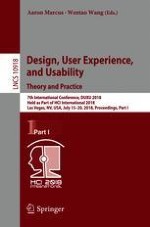2018 | OriginalPaper | Buchkapitel
Human-Computer Interaction to Human-Computer-Context Interaction: Towards a Conceptual Framework for Conducting User Studies for Shifting Interfaces
verfasst von : Stephanie Van Hove, Jolien De Letter, Olivia De Ruyck, Peter Conradie, Anissa All, Jelle Saldien, Lieven De Marez
Erschienen in: Design, User Experience, and Usability: Theory and Practice
Aktivieren Sie unsere intelligente Suche, um passende Fachinhalte oder Patente zu finden.
Wählen Sie Textabschnitte aus um mit Künstlicher Intelligenz passenden Patente zu finden. powered by
Markieren Sie Textabschnitte, um KI-gestützt weitere passende Inhalte zu finden. powered by
